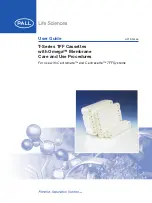
C1 S-VDR service manual
Issue 1
Page 11
3. MAINTENANCE PROCEDURES
3.1 Inspection
Release mount inspection
1. Check the strap for correct tension. Hold the FFC in its mount, locate the HRU
in its holding lugs and clip the strap around the FFC. Slowly operate the strap
latch and assess how much force is needed to close the latch. It should take a
reasonable amount of force to close the latch. If the latch closes too easily
then the strap is too loose; there is a danger that the FCC could be fixed with
the locating lug not engaged.
Add detail.
2. Remove the FCC from its mount, unhook the strap from the mount and
remove the strap with the HRU attached. Read the expiry date marked on the
HRU. If there is less than 3 months to run before expiry then advise that the
HRU is replaced.
3. Check that the release mount is not fractured or deformed.
4. If the mount needs cleaning, use isopropyl alcohol (IPA).
5. Inspect the mount for serviceability. The strap, the latch and its safety pin must
all be fully operational. The presence of small (pin-head) spots of rust on the
metal parts is acceptable.
6. Check the labels fitted to the release mount for damage, readability and
adhesion.
7. Remove the screw retaining the mount bracket and inspect the BIM.
BIM Inspection
The BIM outer case should be in good condition – there should be no visible damage
or rusting. Remove the top cover and inspect the glands – these should be tight.
Tighten to /-25cNm using a 19mm torque driver if required.
FFC inspection
1. Examine both cones for signs of cracking or fracture that might lead to water
ingress. Look in particular around the switches and the 10 bolt mounting holes
as these are under the most stress. Also look for splatters of paint on the
cones as the solvent within the paint might have weakened the plastic. If any
cracks or fractures are present, the cone(s) must be replaced.
2. Check for any evidence of attempts at unauthorized disassembly.
3. Slowly turn the FFC upside down. If any water collects in the top of the
antenna housing, then the FFC has leaked and must be serviced. Also inspect
the top of the circuit board through the clear top cone for traces of white
powdery corrosion. If any corrosion is present then it is very likely that the FFC
has leaked and so must be serviced.
4. Check the battery expiry date marked on the FFC bottom cone has at least 6
months left to run.
5. Check TEST and ON switch boots for damage.
6. Check the labels fitted to the FFC for readability and adhesion.
7. Ensure the integrity seal is intact. This is essential to guarantee that the
battery has not been discharged.
8. Examine the sea switch contacts on the bottom cone. If there are signs of rust,
white powdery corrosion or salt deposits then the contacts must be cleaned.
Содержание 36-001-001A
Страница 1: ...C1 S VDR Service Manual ...
Страница 2: ......
Страница 4: ......
Страница 6: ...C1 S VDR service manual Issue 1 Page 2 S VDR EPIRB in mount ...
Страница 14: ...C1 S VDR service manual Issue 1 Page 10 ...






































